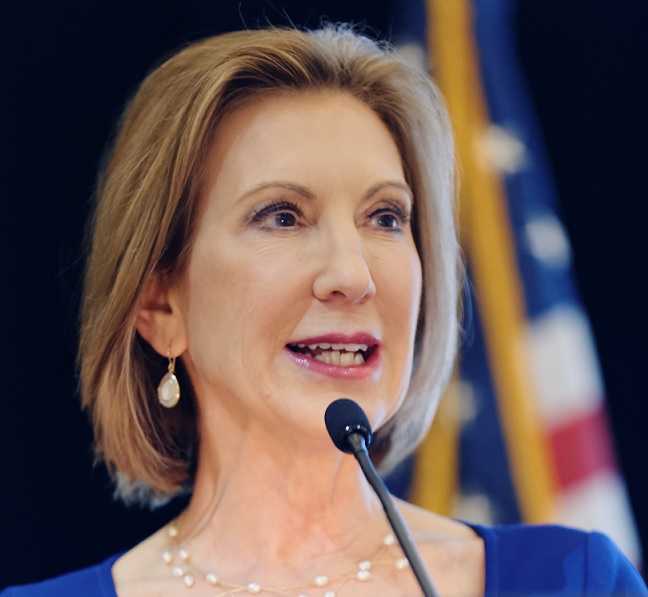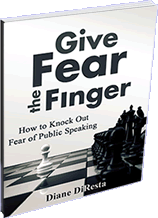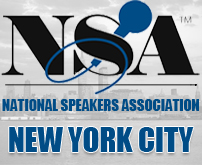Why can't presentations be like fireworks? Why is it that some public speakers create energy explosions while others fizzle out? What if you could create your own fireworks on stage?
The Fear Worse Than Public Speaking
 Public speaking is not the top fear. Don't get me wrong. I work with clients all the time to build their confidence so that they can express their ideas. Speaking enables leaders to influence, build relationships, and advance their careers. It's one of the most powerful business and personal skills with far reaching impact.
But public speaking fear is a temporary obstruction. It can be overcome. However, there is another fear that is much greater. It's slowly creeping into our culture.
Public speaking is not the top fear. Don't get me wrong. I work with clients all the time to build their confidence so that they can express their ideas. Speaking enables leaders to influence, build relationships, and advance their careers. It's one of the most powerful business and personal skills with far reaching impact.
But public speaking fear is a temporary obstruction. It can be overcome. However, there is another fear that is much greater. It's slowly creeping into our culture.
It's the loss of freedom of speech.
Today, as we celebrate Independence Day, I heard a disturbing report on a television news segment. The University of North Carolina published a guidebook for employees on how to avoid micro aggression. They listed words that should not be used in conversation. Here are a few:
Don't say:
- Christmas Vacation because it could insult someone who practices a different religion
- Wife/Girlfriend or Husband/Boyfriend because it discriminates against other sexual preferences. (So do I deny I'm married ?)
- Round of Golf because some people can't afford to play (Have they not heard of municipal courses?)
- I Love Your Shoes because that's discriminating against women. (I have never met a woman who was insulted when I complimented her shoes).
ARE THEY KIDDING? What kind of craziness is this? Who could take this seriously? What great material for Saturday Night Live.
I certainly don't mean to single out UNC. There are other universities that actually have designated free speech zones. REALLY? The first amendment of the Bill of Rights grants freedom of speech not in geographic zones but everywhere. The purpose was to limit the power of government and now we have universities telling us what we can say.
The comedian, Jerry Seinfeld stopped performing at colleges because he got tired of political correctness. Where is our sense of humor?
Whoever controls language controls thought. And that's scarier than any fear of speaking in public. This July 4th, let's give thanks for freedom of speech and have the confidence to speak out.
Happy July 4th !


10 Steps to Confidence
Why do we spend years on developing competence when research proves that CONFIDENCE trumps COMPETENCE? Because we falsely believe that it's our smarts and not our hearts that get us to the top. So how do you learn confidence? Here are 10 steps to confidence.
- Clear. Get clear about who you are as a person and get clear about your presentation outcome. Clarity is the first step to confidence. Focus on your message and establish a benchmark for achieving your presentation outcome.
- Other-Centered. Nervousness is self-centeredness. Turn your attention away from you and toward your audience. Ask, "How can I serve them?" "How can I make them comfortable." Do a deep dive into the minds of your listeners. When you profile your audience, you'll speak their language, create rapport, and you'll feel more prepared.
- Natural. There is only one you. You have your own unique style. Don't set out to give a presentation. Be conversational and be yourself. If you're not funny, don't tell a joke. Share something personal and the audience will relate to you.
- Free from Judgment. Eliminate your need for perfection and stop" shoulding" on yourself. Monitor your self-talk. When you begin the presentation, imagine success. When you finish the presentation, give yourself credit for the things you did well. Confidence develops over time and in a positive atmosphere. Mohammed Ali said "I am the greatest," before he was ever a champion
- Improvise. Public speakers who are wedded to their scripts can be easily caught off guard if they lose their place or if there is a technical glitch. Learning to improvise will boost your confidence. When disaster strikes embrace it instead of freezing in place. Prepare your recovery strategy with ad-lib lines.
- Design. Confident delivery sits on well-designed structure. Confidence begins before you ever open your mouth. It starts with good organization. Good structure will keep you focused and on message, And your audience will be able to follow your points.
- Enthusiastic Enthusiasm sells. When you're excited, you forget your nervousness. Speak from your passion and you'll find your energy increases. Raise your energy by doing something physical. Move around the room. Get louder. Use more gestures.Enthusiasm is contagious and your audience will be excited along with you.
- Network. Do you feel like the naked speaker up there all alone? To gain confidence network before you speak. Get to the room early and practice. As people enter, greet each person with a smile and a handshake. By the time it's your turn to speak you'll be in the company of friends.
- Concise. A speech can quickly unravel if the speaker gets stuck in the weeds of details. To feel confident, get to the point. Create crisp message points and build examples around each point. Instead of rolling their eyes, the audience will hang on your every word.
- Engaging. It's hard to feel confident when you're a talking head. Give fewer facts and tell more stories. Why are stories so powerful? Stories draw the audience in, break down resistance and entice them open to your message. Stories make your message memorable. And here's the bonus point.. A story has a natural sequence so you don't have to worry about losing your train of thought. Simply tell the story. Be in the story and your audience will be engaged.
And the Best Speaker Is....
 Speaking is a leadership skill. Period. It's difficult to lead if you can't convey a clear, compelling message that inspires and moves people to action.
Last night the candidates eagerly awaited the results of the Iowa Caucus. It was a tight race with Hillary Clinton and Bernie Sanders almost tied. But the real winner was the orator of the night-Marco Rubio.
Speaking is a leadership skill. Period. It's difficult to lead if you can't convey a clear, compelling message that inspires and moves people to action.
Last night the candidates eagerly awaited the results of the Iowa Caucus. It was a tight race with Hillary Clinton and Bernie Sanders almost tied. But the real winner was the orator of the night-Marco Rubio.
While Ted Cruz came in first, his victory speech was too long, too analytical, and not inspiring. I kept changing the station in search of commentator's reviews. Each time I toggled back, there was Ted, still droning on. This was a lost opportunity to inspire and build excitement for the next race. I didn't remember much of his speech.
Donald Trump came in a close second. The usually pompous, bombastic Trump took it down a notch and gave a gracious concession speech. He thanked and acknowledged the people of Iowa and congratulated Ted Cruz. This was a different Donald Trump and he won points in building trust with his followers. He kept his remarks brief and didn't make excuses. This was a model for losing gracefully and yet not giving up. In keeping with his entrepreneurial personality, he cut his losses quickly and moved on to the next phase.
The real stand-out was Marco Rubio who was neck-in-neck with Mr. Trump. While his speech was well-prepared, his words and delivery were passionate and heartfelt. He stayed on message with his immigrant story, his family values, and the need to conquer the competing party. We could relate to his classic hero's journey. " This is the moment they said would never happen. For months they told us we had no chance. They said I had to wait my turn". . Although his speech was criticized for sounding much like Obama's speech back in 2012, he left his constituents inspired, exhilarated, and confident in his leadership. Rubio turned a third place result into a victory speech.
On the Democratic side, Hillary Clinton was at her best. Her fire was not only in her belly but on display in her eyes. She also gave a victory speech even though the results were too close to call. Mrs. Clinton connected with her audience and carried her enthusiasm with her as she exited the stage.
Bernie Sanders, although older than Clinton, communicates energy. He, too, was impassioned in his delivery. The young people not only fed off his message of free college and taxing Wall Street, but his energy and strong conviction connected with this audience. He regarded the evening as a tie with Clinton and expressed confidence in winning New Hampshire. Energy sells.
Will the best speaker win? Not necessarily.There's more to winning a political race than public speaking. But excellent presentation skills will elevate a candidate's leadership, enhance the brand, inspire trust and confidence. Words well written and delivered with absolute conviction and passion will always linger in the hearts and minds of the listeners.
Success Means Never Having to Say You're Sorry
 Love Story was a popular move in 1970. It starred Ryan O'Neill and Ali McGraw. In one scene they have a fight and go their separate ways. O'Neill finds McGraw after he cools off and apologizes for the fight. She stops him and says through her tears, "Love means never having to say you're sorry." I don't know if most people in conflict would agree with that.
What people may agree with is the overuse of the word "Sorry" in the workplace. This is especially prevalent among women. When I speak to organizations about executive presence and confidence, I advise women to avoid weak speak or what I call wimpy words. Certain modifiers such as "only," or "just" weaken conviction. That is, the speaker negates everything that follows the words "only" or "just". For example, "This is just an idea," is less powerful than saying "This is an idea."
Love Story was a popular move in 1970. It starred Ryan O'Neill and Ali McGraw. In one scene they have a fight and go their separate ways. O'Neill finds McGraw after he cools off and apologizes for the fight. She stops him and says through her tears, "Love means never having to say you're sorry." I don't know if most people in conflict would agree with that.
What people may agree with is the overuse of the word "Sorry" in the workplace. This is especially prevalent among women. When I speak to organizations about executive presence and confidence, I advise women to avoid weak speak or what I call wimpy words. Certain modifiers such as "only," or "just" weaken conviction. That is, the speaker negates everything that follows the words "only" or "just". For example, "This is just an idea," is less powerful than saying "This is an idea."
Related to these two modifiers is the word "sorry". To use the word "sorry" in emails and spoken language is to the detriment of women. An apologetic communication style sabotages leadership and authority. Leaders are perceived as decisive and willing to take a risk. Saying "sorry' too frequently is a way to avoid taking a stand and not be taken seriously.
The word "sorry" is also used as a substitute for "excuse me". Instead of asking the speaker to clarify or repeat, some women will say "Sorry?" rather than use the more effective phrase, "Excuse me?".
There's an app for that
How can women rid this undermining word from their vocabulary? The first step is awareness. Technology to the rescue! Now there is an app that identifies wimpy words when they are used in emails.
The Just Not Sorry extension for Chrome is downloadable at the Chrome app store. The app identifies wimpy words in Gmail by underlining them in red and providing explanations of how the word weakens the message in the email. Whether the reason for using wimpy words is a subconscious lack of confidence or simply a bad habit, this tool can create conscious awareness for women so that they can become more successful leaders and communicators.
After all, success means never having to say you're sorry.
3 Magic Words that Kill Public Speaking Fear
 Did you ever wonder if there was an Aladdin's Lamp for public speaking? All you would need to do is ask the Genie for the magic words to eliminate fear of public speaking or performance anxiety. Just like the eternal search for the fountain of youth, people still yearn for that elixir, potion, or formula that will make their nervousness vanish.
What I've discovered is that the words you speak have the power to transform how you think. It's not what you say but how you think about your fear. A number of years ago I spoke to a group of company leaders. They, like everyone else, were nervous about public speaking. At one point I looked them straight in the eye and made a statement. After the training seminar, people told me that those words were very powerful and changed how they thought about public speaking.
Did you ever wonder if there was an Aladdin's Lamp for public speaking? All you would need to do is ask the Genie for the magic words to eliminate fear of public speaking or performance anxiety. Just like the eternal search for the fountain of youth, people still yearn for that elixir, potion, or formula that will make their nervousness vanish.
What I've discovered is that the words you speak have the power to transform how you think. It's not what you say but how you think about your fear. A number of years ago I spoke to a group of company leaders. They, like everyone else, were nervous about public speaking. At one point I looked them straight in the eye and made a statement. After the training seminar, people told me that those words were very powerful and changed how they thought about public speaking.
Fast forward to a coaching client who was afraid to speak up in her class. She even thought about dropping out of law school because she was so nervous about public speaking. I told her the same thing I told every public speaker. And then it happened. She started to think differently after I shared those famous words with her. She graduated from law school and went on to give presentations without fear.
Most recently, a former client called me for a refresher. She told me her manager noticed a big improvement in her presentation and the way she interacted with clients. He offered her the refresher coaching session to prepare for their upcoming high stakes presentation. During the meeting, my client shared with me that the words I said to her truly changed how she thought about presentations and public speaking. Are the words really magical? No! The words themselves contain nothing magical. What the words did was reframe the way people were thinking about their fear. They were viewing public speaking through a negative frame and that triggered anxiety.
Even though I'm a seasoned professional speaker, I found myself getting nervous the day before a presentation. It was a 10 minute spotlight for the National Speakers Association. I confided to my friend that I was a nervous wreck. I couldn't wait for it to be over. My friend grabbed me by the shoulders and said, "Diane, don't do that to yourself. You're not nervous. You're energized." So I went home and recited my new mantra: "I'm energized. I'm energized." The next morning I gave my speech and it was a success. Words do make a difference.
The 3 magic words have made an impact on so many people. I think it is time I share them with you. So what are the 3 Magic Words that help people face their fear?
"It's About Them."
When I speak to audiences of nervous presenters, I tell them, "Get over yourself. It's not about you. It's about them." What they've come to realize is that at the very core of public speaking nervousness is a feeling of being self-centered. That's right. If you focus on the fear, you're thinking about yourself. If you think about what the audience wants and needs, you're coming from a place of service.
Language reflects thought. Change your language and you'll change your thinking. The next time anxiety occupies your mind, change your focus. Tell yourself, "It's about them."
What have you said to yourself to change your thinking?
What Carly Fiorina Knows About Public Speaking Gravitas
 Is public speaking the key to winning an election? At the beginning of the debate 40% of the people didn't know Carly Fiorina. According to the google heat map, 82% googled her after her public speaking success. Whether you like her or not, clearly, she gave a stellar performance. She was a stand out among her peers, exuding executive presence and gravitas. What does that mean? If you define gravitas as decisiveness, poise under pressure, assertiveness, and confidence, Carly had it in spades.
Is public speaking the key to winning an election? At the beginning of the debate 40% of the people didn't know Carly Fiorina. According to the google heat map, 82% googled her after her public speaking success. Whether you like her or not, clearly, she gave a stellar performance. She was a stand out among her peers, exuding executive presence and gravitas. What does that mean? If you define gravitas as decisiveness, poise under pressure, assertiveness, and confidence, Carly had it in spades.
Her presentation was clear, focused, and direct. Her tone was confident and not overly emotional. When questioned, she didn't miss a beat. Carly's speech was devoid of hesitations and fillers yet she did not sound canned. Her responses were well thought out and when pressed, she responded with explanations, not defensiveness. Contrasted to Donald Trump, who responded with anger, Carly appeared in control and presidential. Granted, she was not questioned by Megyn Kelly. But the mark of a true leader is to deflect hostile questions and bridge to the message points. Based on her performance in the first debate, there's a good chance she'd be able to handle tougher questioning. As a result of her presentation, she increased her name recognition.
Public speaking is the new competitive advantage. What sets you apart from the competition is your presentation. This was evident when watching some of the other candidates. Although they may have had greater name recognition and a resume of accomplishments, a few candidates came across as flat or nervous. Others were confrontational. Can public speaking be the key to winning an election? Probably not when politics are at play. But the best leaders are great communicators. In politics and in business, excellent presentation skills will make you memorable, extend your brand, and build confidence in your leadership.
Public Speaking Bloopers
 Are you a perfectionist? Get over it. It's killing your presentation. In every speech and presentation class, I tell the audience that I don't allow perfection - for two reasons:
Are you a perfectionist? Get over it. It's killing your presentation. In every speech and presentation class, I tell the audience that I don't allow perfection - for two reasons:
- You can't achieve perfection on earth so why frustrate yourself?
- Even if you could achieve it, people will resent you. Nobody likes a perfect person.
And the same is true for public speakers. Nobody can relate to a perfectly polished presenter. In fact, a public speaker who is too polished can be perceived as slick. The goal is to be human. The audience relates to your humanity, not your perfection. Yes, your presentation needs to be professional and confident. But that doesn't mean you don't trip over a word, occasionally blank out or get loud feedback noise from the microphone. It's not about a perfect presentation. It's about a confident recovery.
People who hear me speak often say, "Diane embodies her message. I learned as much by watching her on stage as I did from her content." Let me assure you that there are times when I screw up. But I make sure I recover with grace. So I'm sharing some recent bloopers as I was preparing new youtube videos. As you can see, effective public speaking and video presentations take a lot of practice. A professional video presentation requires many takes. While the finished video presentation may appear seamless, this peek behind the camera demonstrates that the process takes a lot of practice.
Now that you can see I'm not a perfect public speaker, maybe you'll stop trying to be perfect and get real!
https://www.youtube.com/watch?v=_qHuZfUOujc
May Is Better Speech and Hearing Month
These better speech tips will have you communicating with confidence!
They're Just Not That Into You
Get your audience to like you!
What To Do When You Bomb On Stage
She had always dreamed of being a keynote speaker, and now that moment was here. It was an industry conference and this would be good exposure. She commanded the stage with all the confidence and gravitas of a professional speaker. Her presentation opening was polished and rehearsed, as she showed the audience what she could do. Then, something happened. She lost her voice. No, not her volume. She lost her message!
She froze with a long pause that got longer and longer. At some point, the audience knew from her eyes that this silence was not intentional.The crowd encouraged her with soft mantras. "You go, girl." "You can do it." Finally, she was back in her body and demanded to speak for the remaining two minutes. She grabbed the moment with gusto but this presentation was not her shining moment.
At a women's event, a male stylist was asked to speak about his skin care line. He started off well and then 5 minutes into the talk he excused himself and left the building. Fear got the better of him.
More typical, is the sales presenter who drones on when the prospect is ready to buy. Instead of closing, he covers everything in the deck and talks his way right out of the sale!
So what do you do when you know you're bombing?
1. Take stock and pivot. Quickly assess why it's not going well. Do they seem bored? Then try to engage the audience with a question.
In the case of the sales presentation, if you get a yes, fast forward to the close.
If it's the wrong topic for the meeting, stop, acknowledge the elephant in the room, and be willing to facilitate a discussion, or agree to reschedule the meeting.
2. Breathe. Don't go into panic mode when your brain freezes. You need to get back into your body. Focusing on your breath will help you remain calm. Smile.
3. Summarize. If you go blank, simply summarize the story or material you just presented. This will buy you time.
4. Use a pattern interrupt. One presenter who was behind the lectern, lost her place in the notes. So she did something unexpected. She took out her glasses and slowly adjusted them on her face. This gave her time to find her place. The audience never knew she was lost.
5. Ask for help. I once was on a panel and had a word retrieval issue. I asked the audience, "What is the word I'm looking for?" and then thanked them for their help. No big deal.
6. Pull out your one-liners and come back to the moment. If brain freeze is your fear, plan a number of lines you can use. You can refer to your "senior moment". Comedian Johnny Carson used this technique when a joke didn't get a laugh. He would acknowledge the joke that "just died."
As in sports and politics, you don't always win. Sometimes you win, and sometimes you learn. But you can always recover with grace.
Watch this video - Plan a Recovery Strategy:
And this one - Watch my blooper recovery!
5 Presentation Mistakes When Pitching for Business
Speaking is the new competitive advantage. What makes your product or service stand out in a sea of commodities is your presentation. Don't lose out because of these presentation mistakes:
- Rambling Elevator Speech. If you can't say what you do, for whom, and how they benefit in one minute, your message is too long. The buyer doesn't want to listen to a story. Once your listeners tune out (and they will), you will lose the opportunity to close the sale. The key to a good elevator pitch is focus.
- Thick PowerPoint Deck. Unless you're writing legislation, your PowerPoint deck should take 15 minutes to deliver. The reason it takes longer is that there are too many pages and you're probably reading the slides. Summarize what's on the slide and tell the story behind the numbers. You'll fail to win business if all you do is read a list of numbers on a page.
- Failure to Listen. More than anything else, listening is the key to winning business. You learn the customer's needs by listening. You develop relationships and show you care by listening. Listening helps you to ask the right questions. Too many people try to pitch rather than question and listen. Use the 70/30 rule. 70% of the time the customer is speaking and 30% of the time you're speaking.
- Speaker-Centered.Being speaker-centered is related to the failure to listen and this presentation approach happens before you meet the buyer. Too many pitches and presentations are organized from the speaker's point of view. Nobody cares about your product or service. They care about their own self interests. So create a listener-centered presentation that leads with what the buyer cares about and how your solutions will solve their problem. Talk benefits, not features.
- Lack of Confidence. A great pitch deck with amazing visuals won't win the sale if you don't speak with conviction, enthusiasm and confidence. When you walk into the meeting do you own the room? Are you confident enough to go where the buyer wants to go or do you rigidly stick to the script? Research demonstrates that confidence trumps competence. Prepare and practice. Acknowledge your expertise, breathe, relax, and relate. Remember, the first sale is to yourself.
7 Platform Tips to Punch Up Your Performance
Performing is not about juggling balls in the air or acting on the big stage. Every presentation you give is a performance - even a meeting update! Whether your platform is a convention hall, a boardroom, or the kitchen table, good presentation skills can determine the quality of your performance and result in a successful outcome. Here are 7 platform tips to punch up your performance: Pause strategically. The first pause you take is when you walk on the platform. Look at two people and silently connect. Allow for the silence and then make your opening remarks. Come to a full stop at the end of a sentence. Count 2 beats to yourself before moving on. For greater impact and to evoke emotions, hold the pause even longer. Pause to signal that a point is significant. If you fail to pause, your message will sound like one run-on sentence and the message won't land. Speed talking translates as nervousness. Remember: power is never rushed.
Engage the group. Are you a talking head? Most audiences don't like to be lectured. Savvy public speakers employ engagement techniques to draw attention and maintain interest. You can ask rhetorical questions, flash a photograph on the screen, tell a story, share a case study, create a discussion, or use polling software. Try getting the audience on their feet. Whatever technique you choose, be sure the audience is involved in your message.
Rehearse in the room. The best public speakers rehearse out loud and time themselves. But there is something about practicing in the actual meeting room that makes a difference. I can't tell you why this works. I do know that every time I practice my speech or presentation in an empty room, I always feel more confident.
Find a friendly face. Maybe it's the person who is smiling. Make an eye connection and deliver your opening line to that one person. Don't try to convert the scowling face. That will shatter your confidence. Look at the receptive person and then move on to someone else. Keep looking at friendly faces.
Offer a challenge. Audiences have come to expect to be spoon fed. They lean back in their chairs and wait for you to enlighten them. It's easy for them to expect the presenter to do all the work. After all, you're the expert. You can turn the tables on them and challenge them. Begin your presentation with a challenge to shake them up. And end with a call to action and challenge them to keep their commitment.
Remember the rule of three. A well known principle of effective public speaking is the use of repetition. Martin Luther King used repetition in his I Have a Dream Speech. The speech originally had a different title but because he said "I have a dream" repetitively, it became known by that refrain. The advertising world employs repetition using the rule of three in commercials and jingles. Think of fairy tales - Three Little Pigs, nursery rhymes - Three Blind Mice, and movie titles - Three Men and a Baby. Craft your message with three agenda items, 3 main points, and three benefits, and you'll be clear and memorable.
Mirror the audience. Have you ever hit it off with somebody right away? They were probably just like you. It's the same with audiences. So how can you increase your likability? Mirror them. Notice their body position. How is their energy? Is it fast or slow? What kinds of words or expressions do they use? In one-to-one communication, mirroring is much easier but you can also mirror a large audience. If they are an extroverted sales team, you'll want to raise your energy and volume. If they're more scientific you'll want to tone it down and provide more data.
I recently trained a group of economists in the U.K. and I was in full presentation mode, as I projected my voice and increased my energy. This group was more soft-spoken. During a break, the leader explained that the energy level was quieter in this U.K. company. "So I would be considered loud?" I asked. "Yes!" he answered. What a surprise! In the U.S. I'm considered more soft spoken than some of my peers. I returned to the meeting and toned it down. The meeting was a success.
To punch up your presentations remember to P.E.R.F.O.R.M.
It's Risky to Play It Safe Even With Public Speaking
"The title seems so opposite to your sweet, demure image..."
 This was the email from someone in my networking group after reading the title of my new ebook, Give Fear the Finger: How to Knock Out Fear of Public Speaking. Of course, the title is so NOT me. There was a moment when I considered changing it. It's edgy and has a real New York energy. That's probably why so many of my New York City friends loved the title. But what about others? I took a risk and the feedback is overwhelmingly positive. People from all over love the title!
This was the email from someone in my networking group after reading the title of my new ebook, Give Fear the Finger: How to Knock Out Fear of Public Speaking. Of course, the title is so NOT me. There was a moment when I considered changing it. It's edgy and has a real New York energy. That's probably why so many of my New York City friends loved the title. But what about others? I took a risk and the feedback is overwhelmingly positive. People from all over love the title!
It made me realize that playing it safe can cause us to stagnate even as public speakers. How many of you are giving the same tired speech? What are the risks you're afraid of taking? When you're introduced, do you hand over a boring bio or do you write your own ingenious introduction?
Do you default to being in control as the speaker or do you let go and engage the audience? It can be risky to open up a dialogue but the rich conversational nuggets can have a rewarding outcome.
Are you sentenced to speak to internal company groups or are you ready to take your show on the road?
What about your delivery? Are you wedded to your script or do you engage in repartee with the listeners? Are you willing to wade into the unknown waters of spontaneous humor and playing in the moment?
Does PowerPoint lead you by the nose or can you tell the story without a slide?
Finally, are you concerned about being perfect or can you risk being real? Telling your story can be one of the scariest experiences for a speaker. But here's the truth: People are swayed by emotion. They relate to people who are like them. They trust people who are honest enough to be vulnerable.
So if you're playing it safe and doing what you've always done, you're on shaky ground.
It's risky to play it safe. Even as a public speaker.
Tell me about the risks you've seen speakers take and how it impacted the audience.
Give Fear the Finger-In Search of the Confidence Spot
 FEAR means False Evidence Appearing Real. I once said that to a group of people and a man in the audience retorted, "That's your definition? My definition is 'Forget everything and run!'" (That's the clean version. He actually used another F word).
But isn't it true? We abandon our rational mind and allow the amygdala or reptile brain to take over. This is the place where fear resides. Our eyes first scan for threat. For many public speakers, an audience of strangers is threatening. And that puts them in a state of fear. I discovered that nervous public speakers live in the future of wild imaginings. They focus on what could go wrong. "I hope I don't trip." "What if I lose my train-of-thought?"
FEAR means False Evidence Appearing Real. I once said that to a group of people and a man in the audience retorted, "That's your definition? My definition is 'Forget everything and run!'" (That's the clean version. He actually used another F word).
But isn't it true? We abandon our rational mind and allow the amygdala or reptile brain to take over. This is the place where fear resides. Our eyes first scan for threat. For many public speakers, an audience of strangers is threatening. And that puts them in a state of fear. I discovered that nervous public speakers live in the future of wild imaginings. They focus on what could go wrong. "I hope I don't trip." "What if I lose my train-of-thought?"
Confident public speakers live in the present. They focus on the message and engage the audience. They know how to access their pre-frontal cortex, the part of the brain responsible for rational thinking.
Research shows that CONFIDENCE TRUMPS COMPETENCE. This explains why the confident person who knows less than you, gets promoted. Yes, confidence accounts for more success than knowledge or skills. Many years ago I was bilked out of $30,000 dollars from my bank account. (This was before online banking). Using a fake check, the perpetrator approached the teller in every branch and cashed the check made out to his name. When the detective questioned the bank tellers, they remembered him as "very smooth, confident." Luckily, the bank replaced my funds but we never found the culprit. He may not have been on a stage, but his platform was a teller's window. He inspired trust with his confidence.
The meaning of the word confidence comes from "con" meaning "from" and "fidere" meaning "to trust." It seems that confidence comes from trusting yourself and trusting others. A confident public speaker has a sense of trust-in the message, the audience and oneself.
How do you gain trust if you approach the platform and feel fear? You give fear the finger. But not in the way you think!
My new ebook will show you a way to short circuit anxiety by activating a special spot that few people know. Give Fear the Finger is filled with exercises, tips and techniques to move you from fear of public speaking to confidence on any platform.
Avoiding public speaking is career suicide. You no longer have to submit to fear. Confidence is closer than you think. It's right there in your hands. And it's available now. You can be confident and take center stage in your career and your life.
Speak at Your Own Risk: When Public Speaking is a Lost Opportunity
Speaking is the new competitive advantage. At least that's what I told my audiences until last week. I was excited to attend a wellness conference during the weekend in New York City. The keynote speaker was a celebrity I admired. But what was more exciting were the topics. Most of the speakers were doctors, dentists, and health professionals. The presenters spoke for 20 minutes as in a TED talk format and the presentations continued non-stop throughout the day.
Some of the research was cutting edge and I was eager to learn from the presenters. My enthusiasm quickly turned to boredom after sitting through the first few presentations. Clearly, the presenters were subject matter experts with impressive credentials. But they quickly sacrificed their credibility when they stepped up to the platform. What a lost opportunity! Here are three mistakes that were consistent among the speakers.
1. Using the Microphone Ineffectively
Almost every speaker held the microphone at chest level or too far away from their mouth. When the audience can't hear, they tune out. It also makes the subject matter expert look like an amateur. A microphone should be held no further than four inches below the mouth. My recommendation to the event planner was to provide an attached microphone or require a rehearsal with the hand held mic.
2. Being Speaker-Centered
This is all too common in business. I've experienced it in every kind of speaking situation including sales presentations. There was one woman in particular who spent most of the time telling her story. Not only was it too long; it was all about me, myself, and I. Here's the 411 on the audience. They don't care about you! They're interested in what you and your information can do for them. Yes, tell your story. We want to know you on a personal level. But keep it brief and move on to provide value.
It's not difficult to be listener-centered. I've demonstrated in one minute or less how to take any subject and create a listener-centered opening that speaks to the listener's self interest. It's not about you. It's about them! Chapter 7 in Knockout Presentations reveals the process of Listener-Centered Communication. It's powerful.
3. Bad Timing
Both the presenter and the coordinator are culpable when time commitments are not kept. The reason speakers run out of time is a) they have too much material b) they didn't rehearse out loud. One speaker was telling an interesting story and realized she had two minutes left. She stopped in the middle of the story and quickly flipped through to the end of the PowerPoint slides. The presentation lost impact. And this was a subject I really wanted to hear. At this point, my friend leaned over and whispered, "Diane, this is a real opportunity for you." (Not a good sign).
Were there other mistakes? Yes. But these were the most common errors. Were there any good presenters? Yes. I can think of two, maybe three. The celebrity keynote was excellent. It was obvious that she had a lot of public speaking experience. What is the lesson here? Poor presentation skills do not motivate an audience to action. I didn't approach any of the speakers after hearing them present on stage.
There was a silver lining, though. I won the grand prize - a Vitamix blender! So all was not lost - except the opportunity for the presenters to build their brand and increase their business.
Even Celebrities Screw Up Their Presentations
Most public speakers fear that they will bomb when delivering their presentations. That same performance anxiety affects actors and musicians - even seasoned celebrities. Murphy's Law applies to the best of us. It's inevitable that at some point, something will go wrong with your presentation performance. So how do you recover? A few nights ago in Toronto, Billy Joel forgot some lyrics. Watch how he recovers on stage:
Those of us who are not celebrities can learn a thing or two from those who are. We can't all be as direct in our response as Billy Joel was, but we can develop some recovery strategies. Here's a quick tip on how you can plan for that moment when Murphy's Law finds you making a mistake on the platform:
You don't have to be a perfect public speaker. Confidence is about how your recover from a public speaking faux pas. Plan your recovery strategy, implement it with grace, and carry on. Your audience will like you Just the Way You Are.
How have you recovered from a speaking blooper?
10 Presentation Trends for 2014
In 2014 presentation skills will reign supreme. Leaders and entrepreneurs will need to be more visible across different media platforms. Speaking is the new competitive advantage and the bar has been raised. Here are the trends in presentations that I predict for 2014.
- Broadcasting skills - Whether you're an entrepreneur or employed by a company, expect to have your 15 minutes of fame.Today's presenters need broadcasting skills. Media training will become a vital success skill even for those who do not speak to the press. I'm currently coaching a client to lead quarterly webcasts. Five years ago this senior executive wasn't doing any broadcasting. This client has since been filmed for executive promotional videos. Video presentations will increase in popularity. I use eyejot.com to send quick video emails. Videos can be very effective or very detrimental if you have weak presentation skills.
- Mobile presentations - Mobil technology is exploding and the number of apps is growing. This will require adjustments in the way we communicate. Slide shows and websites must be adjusted for mobile devices.The key word in presentations is portability. On a personal note, I now videotape my coaching clients on the ipad. The quality is as good as a video camera and it's easier to transport.
- Increased Need for Speaker Training - The need for excellent presentation skills will increase.due to the competitive nature of the market. Products and services can quickly become commodities and in order to be persuasive, presenters will need to know how to capture and hold the ear of the listeners.
- Self marketing presentations - Personal branding will become even more important. In a crowded market place where good jobs are at a premium. Job candidates will have to master marketing and selling. That means understanding what makes them unique and how to position themselves, their message, and their value with clarity and impact. Lack of confidence will be the deal breaker. Speakmarketing will be a growing factor for small business success. Presently, I'm coaching small businesses to develop webinars to grow their businesses.
- Storytelling - Telling stories will no longer be the domain for the talented few. Leaders will be challenged to learn the art of storytelling to develop trust, express their vision and to lead their teams. And storytelling skills will be the differentiater in the job interview.Certain companies such as Pepsico, have a culture of storytelling. The best interviewers will invest in public speaking coaching to learn to tell their story instead of presenting their resume.
- Authenticity - Audiences are more sophisticated and less tolerant than ever. They want to know who the speaker is as a person.Do they walk their talk? Audiences will value presenters who are real versus a just-the-facts approach. I was asked to coach somebody who had a well-crafted PowerPoint deck but delivered it like a talking head. Listeners are thinking "Who are you?"
- Increased Audience Interaction - The key word is connection. In a society where there is less time for socializing and more stress, people want to have an experience and participate with the speaker. Watch for increased live polling, tweeting, live streaming,and audience participation. Technology will level the playing field as speakers can now use inexpensive polling software on their mobile devices.There will also be an increase in virtual presentations. I'm coaching more clients remotely due to technology tools.
- Less Fluff More Value - Motivational speakers will always be popular as long as the human soul craves uplifting messages. But today's presenters need more than a string of 'feel good" stories. They must be able to provide value, tips, strategies, action steps, a different way of thinking along with those stories. Audiences are more demanding.
- Shorter Keynote Speeches - The 18 minute TED-like talk will become more commonplace. This is already happening at conferences. Instead of the one to three hour breakout sessions, event planners and audiences are opting for a series of shorter talks.
- Continuity - The old transactional model of giving a one hour presentation and then return to business as usual, will give way to the idea of continuity.The message will continue after the event or meeting with additional contact and add-on resources. Despite the fact that younger audiences are leaving facebook, social media will continue to be an important communication channel for staying connected. However, people will consider the return on their time and become more focused and narrow in their social media communication.
All of these trends can be summarized in one idea: Public speaking is more important than ever. The need for excellent presentation skills is not going away. It will only increase in 2014 and beyond. Just as with technology upgrades,presenters will upgrade their public speaking skills or risk becoming obsolete.
From Good to Great to Awesome Presentations
 How do public speakers go from good to great to awesome? They attend the NYC chapter of the National Speakers Association. The guest speaker for November was executive speech coach, Patricia Fripp. The speaker covered five areas every professional speaker must master in order to be great on the platform:
How do public speakers go from good to great to awesome? They attend the NYC chapter of the National Speakers Association. The guest speaker for November was executive speech coach, Patricia Fripp. The speaker covered five areas every professional speaker must master in order to be great on the platform:
- Strong Structure - Fripp shared the importance of knowing your premise and telling the audience the why and how of your message.
- Compelling Openings - The audience received a page with one liners such as "It never ceases to amaze me...", " The year was... ", "What would the world be like without...?"
- Emotional Connection - To create an emotional opening start with something emotional or heartfelt and back it up with logical reasons.
- Memorable Stories - Stories are powerful and can be any length as long as the audience remains engaged.
- Laser Sharp Specificity - Generalities weaken a presentation. Words like "stuff" dilute the message and confuse the listeners. Remove empty words and use specific language.
After the morning lecture, Fripp spent the afternoon doing quick laser coaching with volunteers. Each speaker spoke no more than two or three lines before the coaching began. It was evident how a powerful opening sets the stage for the rest of the presentation.
To go from good to great to awesome public speaking, remember the five tips: strong structure, compelling openings, emotional connection, memorable stories, and laser sharp specificity.
What You May Not Know About Speaking to Senior Management
 Born in the U.S.A. I was born in the U.S.A.
Born in the U.S.A. I was born in the U.S.A.
Bruce Springsteen
Like the Bruce Springsteen song, you were born in the U.S.A. But just because you're living and employed in the U.S., doesn't mean you're working in the U.S. culture. A client recently shared her surprising insights with me, as we were discussing my training program, Presenting to Senior Management. This client works for a well known corporation that's headquartered outside the U.S.
One Size Does Not Fit All Senior Management
Presenting to senior management continues to be a challenge for many in the workplace. I hear managers complain that their staff is excellent at presenting at staff meetings, but once they go before senior management, they unravel. Managers then feel obligated to attend every meeting. And their employees lose credibility because they defer to their manager, rather than owning their content.
While that scenario is fairly universal, communication becomes more complicated when the parent company is on foreign soil.
It's quite easy to misread the signals across cultures. Even when presenters are well-prepared, they can be perceived as over-confident by non-American senior managers. Americans can be perceived as aggressive without realizing it.
My client shared with me that senior management perceives staff as "not deferential enough". Presenters should refrain from saying "I recommend," advised my client. Presenters should instead substitute the words, "my proposal." The silence of senior management is frequently misinterpreted as acceptance by the U.S. staff, when in fact silence simply means senior management is not on board with the idea.
When this client asks her senior management what they think of a staff member's presentation, they may report that the presenter was "shallow". Upon further probing my client discovered the real meaning - the presenter was not deferential.
The next time you're presenting to senior management, remember it's not about living in the U.S.A. Company cultures are global. If senior management hails from another country, make sure you're familiar with their communication styles and values.
Whether you're company is based in the U.S. or abroad, you can learn how to communicate more effectively with senior management. Click here to learn more.






